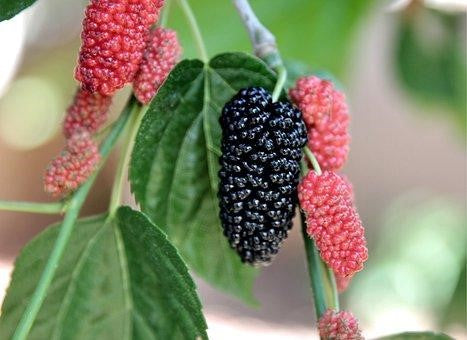
As dog owners, we always want to make sure that our furry friends are getting the best nutrition possible. One way to do this is by incorporating a variety of fruits and vegetables into their diet. One fruit that is often questioned as to whether or not it is safe for dogs to eat is the mulberry. In this article, we will take a closer look at mulberries and explore their potential benefits and drawbacks when it comes to feeding them to dogs.
What are Mulberries?
Mulberries are a type of berry that grows on trees and shrubs in the Morus genus. They are typically red, black, or white in color and have a sweet, tangy flavor. These berries are known to be high in antioxidants, vitamins, and minerals, making them a healthy addition to a human diet.
Can dogs eat mulberries?
Yes, dogs can eat mulberries, but it is important to do so in moderation and to consult with a veterinarian before introducing any new food to your dog's diet. It's also important to note that dogs with certain health conditions, such as diabetes or kidney problems, should avoid eating mulberries altogether.

Benefits of feeding dogs with mulberries
Feeding dogs with mulberries can provide some potential benefits, such as:
- Nutritional Value: Mulberries are an excellent source of vitamins and minerals, including vitamin C, vitamin K, and iron. These nutrients can help support a dog's overall health and well-being.
- Antioxidant Properties: Mulberries are also high in antioxidants, which can help protect against cellular damage and support a dog's immune system.
- Low in calories: Mulberries are relatively low in calories, which makes them a great option for dogs that need to maintain a healthy weight.
It is important to note that feeding dogs with mulberries should be done in moderation, as too many mulberries can lead to stomach upset and dogs with certain health conditions, such as diabetes or kidney problems, should avoid eating mulberries altogether. It's always best to consult with your veterinarian before introducing any new food to your dog's diet to ensure that your dog's diet is balanced and nutritionally complete.
Disadvantages of feeding dogs with mulberries
While there are potential benefits to feeding dogs with mulberries, there are also some potential drawbacks to consider, such as:
- High sugar content: Mulberries contain a high amount of natural sugars, which can be a concern for dogs that are prone to diabetes or other blood sugar issues.
- Stomach upset: Some dogs may experience stomach upset after consuming mulberries, especially if they eat too many at once.
- Not enough fiber: Mulberries don't have high fiber content which may not be helpful for dogs with digestion issues.
- Allergic reactions: Some dogs may have allergic reactions when consuming mulberries, which can cause symptoms such as itching, swelling, and difficulty breathing.
It is important to note that feeding dogs with mulberries should be done in moderation, and it's always best to consult with your veterinarian before introducing any new food to your dog's diet to ensure that your dog's diet is balanced and nutritionally complete.

Considerations involved in feeding dogs with mulberries
When feeding dogs with mulberries, there are some other considerations to keep in mind:
- Moderation: As with any new food, it is important to introduce mulberries to your dog's diet in small amounts and to monitor their reaction. Gradually increasing the amount over time can help prevent stomach upset.
- Consult with veterinarian: It's always best to consult with your veterinarian before introducing any new food to your dog's diet, especially if your dog has any health conditions or is on any medications.
- Fresh or dried mulberries: It is best to feed your dog with fresh mulberries, but if you're using dried ones make sure they are unsweetened and without any added preservatives or chemicals.
- Other food options: While mulberries can be a healthy addition to your dog's diet, it's important to remember that they should not make up the bulk of your dog's diet. A balanced diet should always include a variety of fruits and vegetables, as well as a high-quality protein source.
- Pesticides: Make sure to wash the berries thoroughly to remove any pesticide residue.
Overall, feeding dogs with mulberries can be a healthy addition to their diet, but it should be done in moderation, with the guidance of a veterinarian, and in conjunction with a balanced diet.
If you are looking for alternative fruits to feed your dog, here are a few options:
- Apples: Apples are a great source of vitamin A and fiber, which can support a dog's overall health and digestion.
- Blueberries: Blueberries are high in antioxidants and can help support a dog's immune system.
- Cranberries: Cranberries are high in vitamin C and can help support a dog's urinary tract health.
- Strawberries: Strawberries are high in vitamin C and antioxidants, which can help support a dog's immune system.
- Raspberries: Raspberries are also high in antioxidants and can help support a dog's immune system.
- Pumpkin: Pumpkin is a good source of fiber and beta-carotene, which can help support a dog's digestion and eye health.
It's important to note that it's always best to consult with your veterinarian before introducing any new food to your dog's diet to ensure that your dog's diet is balanced and nutritionally complete.
Concluding Words
Mulberries can be a healthy addition to a dog's diet, as long as they are consumed in moderation. However, it's always best to consult with your veterinarian before introducing any new food to your dog's diet. As always, a balanced and nutritionally complete diet is crucial for your dog's overall health and well-being.



